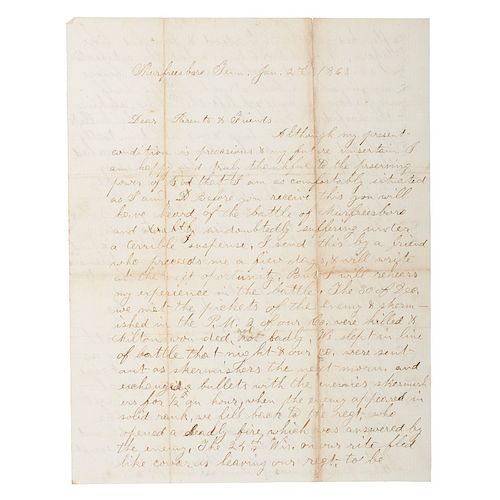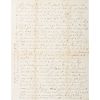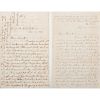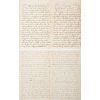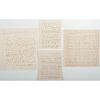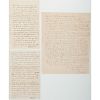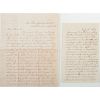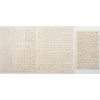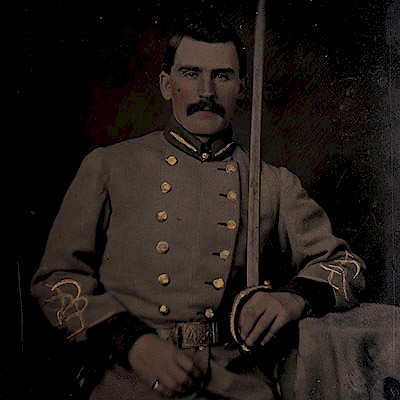Private Freeman S. Dunklee, 36th Illinois Infantry, Civil War Archive Incl. Detailed Account of Participation in Battle of Murfreesboro, In Which he w
About Seller
6270 Este Ave.
Cincinnati , OH 45232
United States
With offices in Cincinnati, Cleveland and Denver, Cowan’s holds over 40 auctions each year, with annual sales exceeding $16M. We reach buyers around the globe, and take pride in our reputation for integrity, customer service and great results. A full-service house, Cowan’s Auctions specializes in Am...Read more
Two ways to bid:
- Leave a max absentee bid and the platform will bid on your behalf up to your maximum bid during the live auction.
- Bid live during the auction and your bids will be submitted real-time to the auctioneer.
Bid Increments
| Price | Bid Increment |
|---|---|
| $0 | $25 |
| $500 | $50 |
| $1,000 | $100 |
| $2,000 | $250 |
| $5,000 | $500 |
| $10,000 | $1,000 |
| $20,000 | $2,500 |
| $50,000 | $5,000 |
| $100,000 | $10,000 |
About Auction
Jun 22, 2018
Cowan’s American History: Premier Auction, scheduled for June 22, 2018 is comprised of early photographs, documents, manuscripts, broadsides, flags, and more dating from the Revolutionary War, the Civil War, Late Indian Wars, World War I and II and beyond. Cowan's Auctions dawnie@cowans.com
- Lot Description
Lot of 19 letters written by Private Freeman S. Dunklee, Co. A, 36th Illinois Infantry, to his family at home in Barrington, IL.
The thoughtful and highly reasoned Civil War correspondence of Freeman Dunklee span the years 1861 thru 1864. As the 36th Illinois moved toward southern battles, Private Dunklee posted letters from Camp Hammond and Camp Rolla, MO. In March of 1862 Freeman writes to request all possible news from home. He notes that “The boys are eagerly looking forward to the day when we shall all go home...” The soldiers in Dunklee’s group have coined the term “Copper bottoms” for the residents of Barry County, MO who visit the Union camp daily offering eggs, buttermilk, sauerkraut, pies and ginger cakes for sale to the soldiers. The term “copper bottoms” referred to their homemade clothing consisting of blue coats and copper colored pants.
A March 30th, 1862 letter home notes the boredom of guarding the camp. He writes that recruiters have come to the camp offering a $100 bonus plus a 30 day furlough in exchange for a 3 year enlistment in the regular service. He writes...“our worthy opponents ( Old Price & Van Dorn ) are at Van Buren on the Arkansas River 4 miles from Fort Smith and getting their forces across the river to go south." Sterling Price had been a former governor of Missouri and attained the rank of major general in the army of the CSA.
Acquiring food for the troopers in the field was an ongoing struggle. Dunklee records in a letter from Rienzi, MS that guerillas were active for the Confederacy. “Captain Pierce of Company D sent his wife with a Corporal and driver in an ambulance into the country to procure vegetables. After an absence of nearly 2 days she returned on horseback.” They had been taken captives. The soldiers and the team were kept but the Captain’s wife was returned as “they could not benefit themselves with her.”
Private Dunklee’s letter of January 2, 1863 from Murfreesboro, TN describes for his parents the battle in which he was wounded and taken prisoner. Two men of the 36th Illinois had been killed in skirmishes on December 30th. He relates: “We slept in the line of battle that night and our Company were sent out as skirmishers the next morning. When the enemy appeared in solid rank we fell back to the regiment who opened a deadly fire which was answered by the enemy. The 24th Wisconsin on our right fled like cowards leaving the regiment to be flanked. Yet the 36th stood and fought like tigers. I fired 5 or 6 times and had the satisfaction of seeing at least 2 of the enemy fall before my gun when a ball struck my leg about halfway above my knee and I left the show seeking the hospital. While I was retiring the bullets played a perfect tune and one went into the blanket on my back. Soon after I reached the hospital the enemy had taken possession of it and I with many others was taken prisoner. I walked [by the help of a Confederate soldier] to town, a distance of about 3 miles.” He describes his quarters as a “very comfortable building”. Rations had been issued, Union and Confederate doctors had worked to treat the prisoner’s wounds. Assuring his mother, the private states “I had the ball cut out of my leg yesterday and mom it is getting along finely.”
A ringing condemnation of slavery, southern agriculture, southern food, the southern dialect and the general short comings of the southern educational system are all expounded on in Private Dunklee’s letter of August 3rd, 1864 from Nashville, TN.
He relates that “a Negro soldier on guard ordered a citizen not to cross his beat.” He was told that a “southern gentleman was not to be imposed upon by a nigger if he was a soldier.” Obeying his orders the soldier shot the citizen. A loud fuss was raised with the soldier arrested and taken to General Millroy. The General released him saying he liked to see a soldier doing his duty whether black or white. Private Dunklee wrote “This is very different to what it was here a few short years ago. One can hardly believe that so great an evolution could take place in so short a time...the institution [slavery] has been sapping the South; for it has ruined its morals, encouraged ignorance, overthrew it politics and in short degraded the whole population in every way.” Dunklee states “he stands ready to welcome the day when slavery shall be wiped out. And to do this we must see that Lincoln is President for the next term.”
On September 15th, 1864, Dunklee sends a final letter to his home before he is discharged. He reflects on the many friends and associates he will miss. He also notes he had heard a long speech by [Tennessee] Governor and later President Andrew Johnson. Freeman Dunklee believed him to be “a good match for old Abe.” A closing description of Private Freeman Dunklee comes from one of his earlier letters, written after having slept the night on the sidewalk at the depot in Cincinnati while arranging to load Company A’s equipment on to the steamboat for transport down the Ohio River: “I try to do my duty to myself and my country and take things as they come.”
Eliminate the Hassle of Third-Party Shippers: Let Cowan's Ship Directly To You!Condition
If you'd like a shipping estimate before the auction, contact Cowan's in-house shipping department at shipping@cowans.com or 513.871.1670 x219. - Shipping Info
-
Buyers are required to pay for all packing, shipping and insurance charges. Overseas duty charges are the responsibility of the successful Bidder. Be aware that for larger and/or valuable items, shipping charges can be substantial. - If there is no shipping amount on listed your invoice, you will need to make arrangements to pick up or ship your purchase through an alternative shipping company. Our shipping department can be contacted at 513.871.1670 (ext. 219) or email shipping@cowans.com. - Shipping charges include insurance for your order while in transit. If you have private insurance we will adjust your charge to include only packing and shipping. - Please allow 14 – 21 days after payment to package and ship your purchase as carefully as possible.
-
- Buyer's Premium



 EUR
EUR CAD
CAD AUD
AUD GBP
GBP MXN
MXN HKD
HKD CNY
CNY MYR
MYR SEK
SEK SGD
SGD CHF
CHF THB
THB